Year :
2001
Title :
Mathematics (Core)
Exam :
WASSCE/WAEC MAY/JUNE
Paper 1 | Objectives
41 - 49 of 49 Questions
| # | Question | Ans |
|---|---|---|
| 41. |
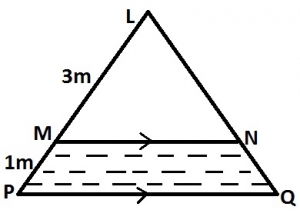 In the diagram, MN||PQ, |LM| = 3cm and |LP| = 4cm. If the area of ∆LMN is 18cm2, find the area of the quadrilateral MPQN A. 3cm2 B. 6cm2 C. 14cm2 D. 24cm2 Detailed SolutionUsing similar triangles\(\frac{3}{16}=\frac{4}{x}\\ x = \frac{18\times4}{3}=24cm^2\) ∴Area of quadrilateral MPQN \(=24cm^2 - 18cm^2 = 6cm^2\) |
|
| 42. |
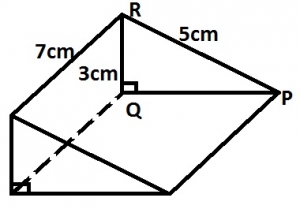 The diagram shows a triangular prism of length 7cm. The right - angled triangle PQR is a cross section of the prism |PR| = 5cm and |RQ| = 3cm. What is the area of the cross-section? A. 4 cm2 B. 6cm2 C. 15cm2 D. 20cm2 Detailed SolutionIn \(\Delta\) RQP, QR\(^2\) + QP\(^2\) = RP\(^2\)3\(^2\) + QP\(^2\) = 5\(^2\) QP\(^2} = 5\(^2\) - 3\(^2\) QP = \(\sqrt{16}\) = 4 cm \(\therefore\) Area = \(\frac{1}{2} \times base \times height\) = \(\frac{1}{2} \times 3 \times 4\) = 6 cm\(^2\) |
|
| 43. |
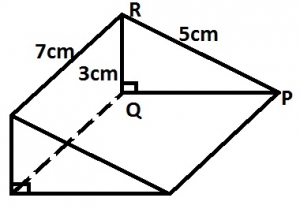 The diagram shows a triangular prism of length 7cm. The right - angled triangle PQR is a cross section of the prism |PR| = 5cm and |RQ| = 3cm. What is the volume of the prism? A. 28cm2 B. 42cm2 C. 70cm2 D. 84cm2 Detailed SolutionVolume of prism = Area x heightIn \(\Delta\) RQP, QR\(^2\) + QP\(^2\) = RP\(^2\) 3\(^2\) + QP\(^2\) = 5\(^2\) QP\(^2} = 5\(^2\) - 3\(^2\) QP = \(\sqrt{16}\) = 4 cm \(\therefore\) Area = \(\frac{1}{2} \times base \times height\) = \(\frac{1}{2} \times 3 \times 4\) = 6 cm\(^2\) Volume = 6 x 7 = 42 cm\(^3\) |
|
| 44. |
A solid cylinder of radius 7cm is 10 cm long. Find its total surface area. A. \(70\pi cm^2\) B. \(189\pi cm^2\) C. \(210\pi cm^2\) D. \(238\pi cm^2\) Detailed SolutionS = \(2\pi r^2 + 2\pi rh\)= \(2\pi r(r + h)\) = \(2\pi (7) (7 + 10)\) = \(238\pi cm^2\) |
|
| 45. |
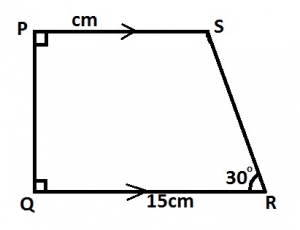 PQRS is a trapezium in which |PS| = 9cm, |QR| = 15cm, |PQ| = \(2\sqrt{3}, \angle PQR = 90^o and \angle QRS = 30^o\). Calculate the area of the trapezium A. \(24\sqrt{3} cm^2\) B. \(36\sqrt{3} cm^2\) C. \(42\sqrt{3} cm^2\) D. \(72\sqrt{3} cm^2\) |
A |
| 46. |
The variance of a given distribution is 25. What is the standard deviation? A. 125 B. 75 C. 25 D. 5 Detailed SolutionS.D = \(\sqrt{Variance}\)= \(\sqrt{25}\) = 5 |
|
| 47. |
Given that P = {b, d, e, f} and Q = {a, c, f, g} are subsets of the universal set U = {a,b, c, d, e, f, g}. Find P' ∩ Q A. {a,c} B. {a, c, d, g} C. {c, d, g} D. {a, c, g} Detailed SolutionU = {a, b, c, d, e, f, g}P = {b, d, e, f} Q = {a, c, f, g} P' = {a, c, g} P' \(\cap\) Q = {a, c, g} |
|
| 48. |
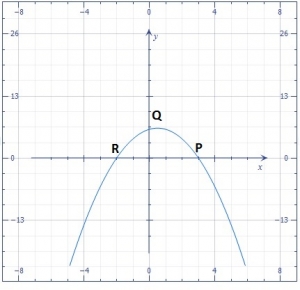 What is the length of \(\bar{RP}\)? A. 6 B. 5 C. 3 D. 2 Detailed Solution\(\bar{RP} = 3 - (-2)\)= 5 |
|
| 49. |
 The number line represents A. 0 > x \(\geq\) -7 B. -7 \(\leq\) x < -1 C. -7 < x \(\leq\) -1 D. -7 < x < -1 |
C |
| 41. |
 In the diagram, MN||PQ, |LM| = 3cm and |LP| = 4cm. If the area of ∆LMN is 18cm2, find the area of the quadrilateral MPQN A. 3cm2 B. 6cm2 C. 14cm2 D. 24cm2 Detailed SolutionUsing similar triangles\(\frac{3}{16}=\frac{4}{x}\\ x = \frac{18\times4}{3}=24cm^2\) ∴Area of quadrilateral MPQN \(=24cm^2 - 18cm^2 = 6cm^2\) |
|
| 42. |
 The diagram shows a triangular prism of length 7cm. The right - angled triangle PQR is a cross section of the prism |PR| = 5cm and |RQ| = 3cm. What is the area of the cross-section? A. 4 cm2 B. 6cm2 C. 15cm2 D. 20cm2 Detailed SolutionIn \(\Delta\) RQP, QR\(^2\) + QP\(^2\) = RP\(^2\)3\(^2\) + QP\(^2\) = 5\(^2\) QP\(^2} = 5\(^2\) - 3\(^2\) QP = \(\sqrt{16}\) = 4 cm \(\therefore\) Area = \(\frac{1}{2} \times base \times height\) = \(\frac{1}{2} \times 3 \times 4\) = 6 cm\(^2\) |
|
| 43. |
 The diagram shows a triangular prism of length 7cm. The right - angled triangle PQR is a cross section of the prism |PR| = 5cm and |RQ| = 3cm. What is the volume of the prism? A. 28cm2 B. 42cm2 C. 70cm2 D. 84cm2 Detailed SolutionVolume of prism = Area x heightIn \(\Delta\) RQP, QR\(^2\) + QP\(^2\) = RP\(^2\) 3\(^2\) + QP\(^2\) = 5\(^2\) QP\(^2} = 5\(^2\) - 3\(^2\) QP = \(\sqrt{16}\) = 4 cm \(\therefore\) Area = \(\frac{1}{2} \times base \times height\) = \(\frac{1}{2} \times 3 \times 4\) = 6 cm\(^2\) Volume = 6 x 7 = 42 cm\(^3\) |
|
| 44. |
A solid cylinder of radius 7cm is 10 cm long. Find its total surface area. A. \(70\pi cm^2\) B. \(189\pi cm^2\) C. \(210\pi cm^2\) D. \(238\pi cm^2\) Detailed SolutionS = \(2\pi r^2 + 2\pi rh\)= \(2\pi r(r + h)\) = \(2\pi (7) (7 + 10)\) = \(238\pi cm^2\) |
|
| 45. |
 PQRS is a trapezium in which |PS| = 9cm, |QR| = 15cm, |PQ| = \(2\sqrt{3}, \angle PQR = 90^o and \angle QRS = 30^o\). Calculate the area of the trapezium A. \(24\sqrt{3} cm^2\) B. \(36\sqrt{3} cm^2\) C. \(42\sqrt{3} cm^2\) D. \(72\sqrt{3} cm^2\) |
A |
| 46. |
The variance of a given distribution is 25. What is the standard deviation? A. 125 B. 75 C. 25 D. 5 Detailed SolutionS.D = \(\sqrt{Variance}\)= \(\sqrt{25}\) = 5 |
|
| 47. |
Given that P = {b, d, e, f} and Q = {a, c, f, g} are subsets of the universal set U = {a,b, c, d, e, f, g}. Find P' ∩ Q A. {a,c} B. {a, c, d, g} C. {c, d, g} D. {a, c, g} Detailed SolutionU = {a, b, c, d, e, f, g}P = {b, d, e, f} Q = {a, c, f, g} P' = {a, c, g} P' \(\cap\) Q = {a, c, g} |
|
| 48. |
 What is the length of \(\bar{RP}\)? A. 6 B. 5 C. 3 D. 2 Detailed Solution\(\bar{RP} = 3 - (-2)\)= 5 |
|
| 49. |
 The number line represents A. 0 > x \(\geq\) -7 B. -7 \(\leq\) x < -1 C. -7 < x \(\leq\) -1 D. -7 < x < -1 |
C |